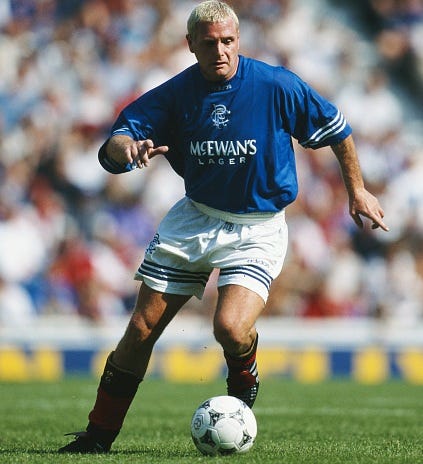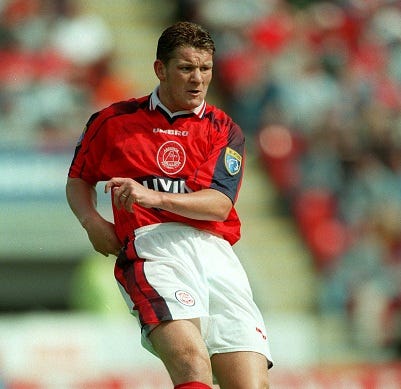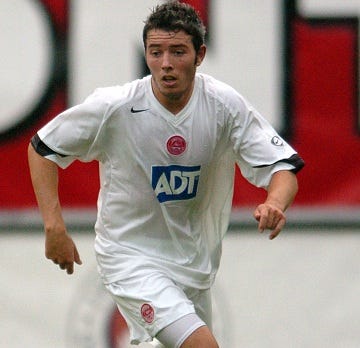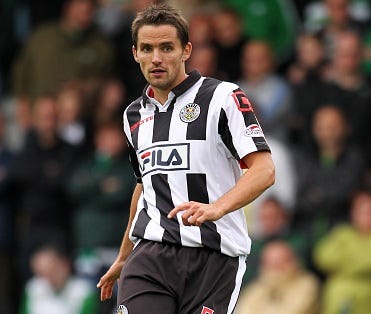GAME OVER #1: Bankruptcy, mental health crashes and marital strains... what happens to footballers when the whistle blows on their career
🗣️"When you go from earning 100 grand a year to 20 grand a year, it puts a big financial strain on the family"
Award-winning sportswriter Stephen McGowan writes monthly investigations for Nutmeg FC. This week, he examines the sudden impact on footballers when they hang up their boots.
🗣️ Tomorrow: Part II — First-hand accounts of life after football from former professionals Rory Loy, Lee Mair and Mark Reilly.
🗣️ Friday: Part III — Chris Higgins and Fraser Wishart of PFA Scotland outline the full range of steps being taken to help players adapt to real life when the floodlights go off.
This article is free, but parts II and III, like most of our content, are paid. Don’t miss out… get a Nutmeg season ticket. Sign up in August and get 12 months of access PLUS a year’s subscription to the beautiful, 200-page print quarterly — delivered straight to your door. The new edition is out in September, so grab this offer NOW.
By Stephen McGowan
In January 2022, Kevin McNaughton took to social media to issue a cry for help. Depressed by the end of his football career and the breakdown of a relationship, a number of disturbing tweets sparked a nationwide manhunt.
For two decades McNaughton had been a talented, respected Scottish footballer. He had played over 200 times for Aberdeen, moving to Wales where he became a Cardiff City icon, playing in the English Premier League. He also earned four caps for Scotland.
Released in 2015, his career followed the same downward trajectory as with so many players over the age of 30. He played for Wigan Athletic and Inverness Caledonian Thistle. He reversed a decision to hang up his boots to play some games for Forfar Athletic to help the club through an injury crisis. His final game in senior football came at the age of 36.
Speak to any footballer about retirement and the fear in their eyes is hard to miss. At the age of 34, James Forrest has won more medals than any Celtic player in history. Thirteen league titles, seven Scottish Cups and six League Cups surpass the previous record held by Lisbon Lion Bobby Lennox.
One day, the medals will stop coming. Decades of discipline, structure, daily exercise, adrenalin, celebrity, money and adoration will come to an end. The phone will stop ringing and, while Forrest has earned more money than most, real life will come at him fast. The prospect, he admits, frightens him.

“It is scary because you left school at 15 or 16 and football is all you have ever done and all you have ever known,” he said.
“I want to keep playing for as long as I can, but it is scary because you hear lots of different players who have retired now and go down different paths once they finish. I don’t really know what I want to do after, football is what I’ve done for 20 odd years.”
Some land on their feet with a new role as a coach, a manager, a sporting director or a pundit. Others, like Paul Gascoigne and Dean Windass, find the transition to Civvy Street treacherous and difficult to negotiate.
XPro, a charity set up to help and guide former footballers, published a study in 2013 claiming that three out of five retired English Premier League players were bankrupt within five years of hanging up their boots.
Among the list of former pros declared bankrupt are David James, Celestine Babayaro, John Arne Riise, Colin Hendry, Lee Hendrie, Eric Djemba-Djemba, Keith Gillespie, John Barnes, Jason Euell, Carl Cort and Chris Sutton.
A troubled figure, former Rangers star Gazza narrowly avoided bankruptcy in 2016 while former Aberdeen attacker Windass tried to take his own life and spent 26 days in rehab for alcohol dependency before he lost everything.
Former PFA chief executive Gordon Taylor disputed the Xpro figures, claiming that the real number of bankrupt ex-footballers was between 10% and 20%. Undeterred, the charity published further research stating that a third of former footballers divorced within a year of hanging up their boots.


Kevin McNaughton’s separation from his partner triggered a series of worrying tweets after his car — containing all his worldly possessions — was stolen four years ago. Reaching a point where he felt nothing more could go wrong, one of them read: “Let my kids know I’ll hover above, I’ll always love them, they’re too good for me”.
As friends and former teammates appealed for help and information on social media, the Dundonian was found safe, if not well.
In an interview with Sky Sports a year later, he reflected on his struggles after retirement. “I just got myself in a bit of a mess really, which stemmed from not really being prepared for life after football,” he said.
“My life had slowly sort of disintegrated after I stopped playing. My relationship sort of fell to pieces and then off the back of that, I probably isolated myself a bit as well when I should have really been speaking to other people and getting help. Looking back, that was obviously a mistake. It was a difficult time.”
He’s in a better place these days, working 12-hour days at Ninewells Hospital. Back in football as manager of sixth-tier club Dundee North End restored a sense of purpose absent the night he sent the tweets which he now acknowledges were “a cry for help”.
“Looking back, I can’t actually remember sending them. I’d taken quite a lot of the medication I was on and with alcohol. I was a mess, really.
“I was lucky enough that I did send them out. It was maybe a cry for help. I had got to that sort of stage of rock-bottom, I think. The police found me with my medication and alcohol. They could see I was in a state.”
Former Dundee, Aberdeen and St Mirren defender Lee Mair was one of those keen to track down an old pal.
Mair retired at the age of 35 after a stint as assistant manager of Stranraer in 2016. He became a photocopier salesman, and his income was greatly reduced. However an entrepreneurial streak made him apply to be a contestant on The Apprentice before he established his own finance company. One of the options he considered was a business to help footballers struggling with the transition to normal life after playing.
“When you go from earning 100 grand a year to 20 grand a year, that puts a big financial strain on the family,” he told Nutmeg.


“You go from working two hours a day to 10 hours a day and you are not there to help the kids and stuff. The wife has to go out to work where she never needed to in the past and that puts strain on the marriage.
“I played with players who have suffered depression, bankruptcy or divorce since retiring. I have seen all three with my own eyes and that’s why I felt very passionate about setting something up to help footballers because it’s not just them who suffers, it’s their family and their extended family beyond that.
“The transition from football doesn’t just impact a footballer, it impacts dozens and dozens of people and there needs to be more done for that.
“I think it’s better these days, better than in my day when it was a case of, ‘See you later, don’t let the door slam behind you’.
“But ask yourself what the vast majority of kids dream of being when they are older: they want to be a footballer. If you were to tell them that between the age of 36 and 38, 60% of them would be divorced, depressed or bankrupt then they might not be quite so keen to go down that route.
“So I think there needs to be more help for people in football so that when they do transition, they already have something on the side going on and there isn’t quite such a big void at the end.”
Kevin McNaughton found support from Back Onside, the mental health charity. In July, PFA Scotland, the players’ union, announced a partnership with Sporting Chance, the support group established by former Arsenal captain Tony Adams to provide mental health and emotional wellbeing support to professional athletes. Access to a 24/7 helpline is now available with the option of an in-person or virtual therapy session.


